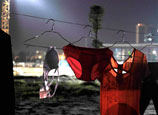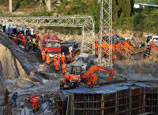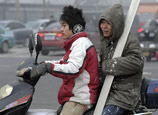
KANDAHAR, Afghanistan, May 21 (Xinhua) -- Despite Taliban threat and intimidation, more and more women in the southern Kandahar province, the erstwhile spiritual capital of the Taliban, have gone to school and get involved in social activities.
"Afghan women have realized that education is power. It is the key to succeed. Education changes the living conditions and the future of women. We have been living in a state of conflict and instability for three decades and it is time for us to get educated," Spina, 18, told Xinhua in a recent interview in Kandahar city, the provincial capital of Kandahar province, which is some 450 km south of Kabul.
Domestic violence, security problems and tribal traditions in parts of the conservative Afghanistan often bar girls to attend school or to get higher education.
"The uncertain security and intimidation make difficult to have equitable access to good quality education especially for girls. But despite these conditions, I attend a literacy class every day, " said Spina, who, like most Afghans has only one name, has also been a victim of violence against women.
Spina said that shortly after she got married, her mother-in- law began accusing her of not doing her household chores. She was also maltreated and this has ultimately led to her divorce and now she is living with her parents again. Spina's father, according to her, had paid more than 2,000 U.S. dollars to her in-laws so that they will agree to sign her divorce papers.
"If my husband's family were educated people, they would not have mistreated me," Spina said.
Up to now, the militant Taliban is still active in Kandahar. The fanatical group emerged in 1994 and disappeared in late 2001 following the U.S.-led military campaign in Afghanistan.
During its rule, the Taliban had barred girls from schooling and confined women to their houses.
The Afghanistan Women Foundation, a non-government body supporting women rights in the conflict ridden country, runs literacy courses for women, besides setting up several handicraft and tailoring classes in Kandahar and adjoining provinces.
"The aim of holding literacy and vocational classes is to promote women activities, help them stand on their feet and encourage them to contribute in the rebuilding process of the country," said managing director of the body, Sohila, who like Spina, goes by only one name.
At first, Spina said, her father and brothers did not want her to go to school because all the teachers there are males.
But scores of other women, almost all wearing burka, a traditional Afghan Islamic dress that covers head to toe, have been receiving training in the classes.
According to Afghan officials, the rate of literacy for male in the war-hit country is 39 percent while female literacy rate remains at only 13 percent. Several thousand Kandahari women have graduated from literacy and vocational courses in Kandahar over the past six years, Sohila said.
"Now we can write and read. We can work as tailor to make money and support our families," a Burka wearing lady, Abida Jan said.
Some 8.4 million students, 39 percent of them girls, now go to school in the post-Taliban Afghanistan, according to officials.
Kandahar has also experienced acid attacks on school girls. In November 2008 three female students were attacked and their faces disfigured.
On May 16, in the latest Taliban attack in Kandahar, twin car bombs left nine people dead and 60 others injured, majority of them civilians.
















 University doors open for its security guards
University doors open for its security guards


![]()
